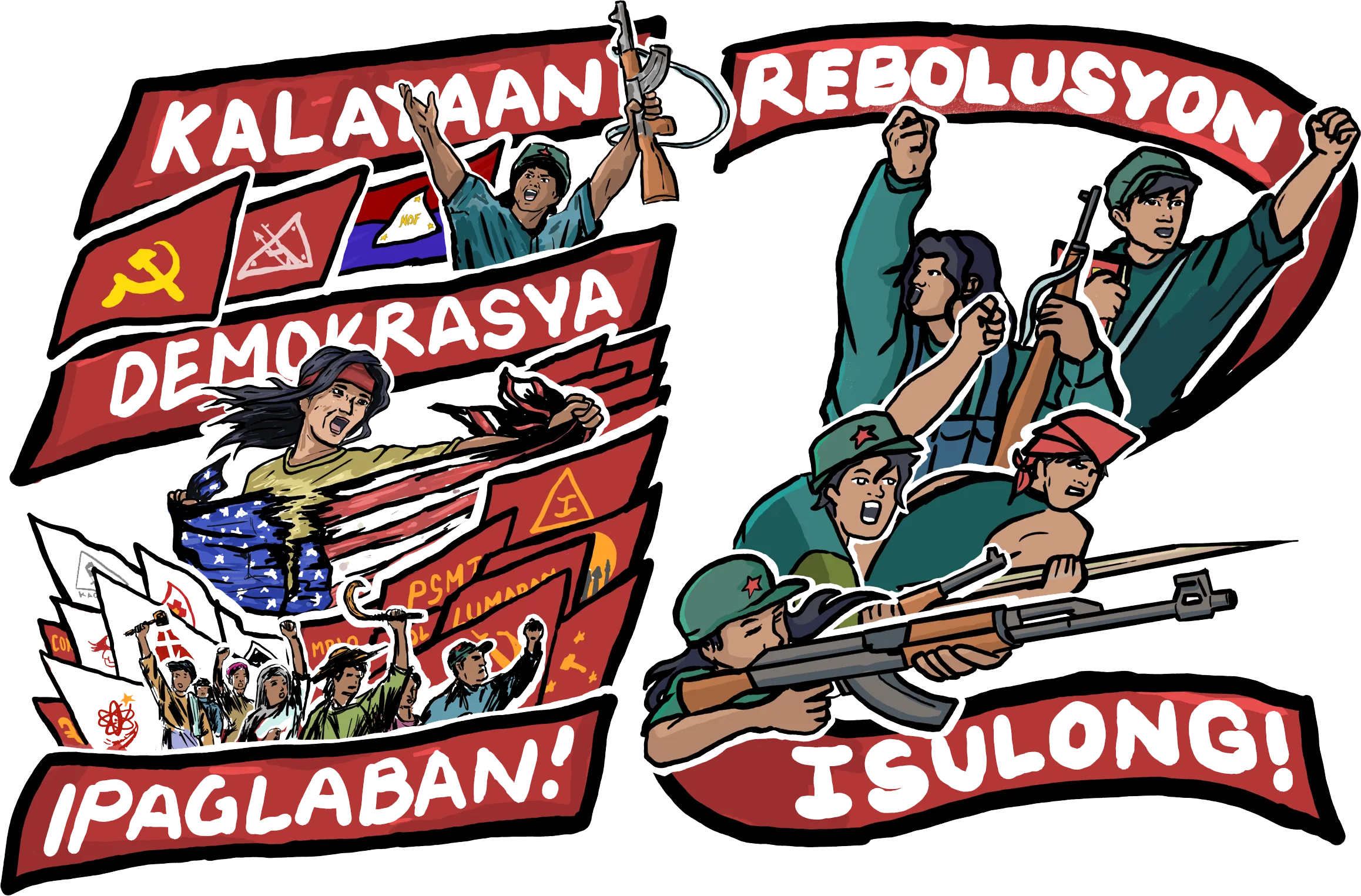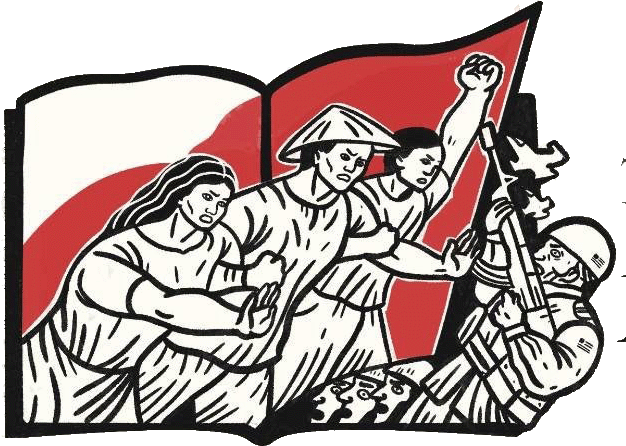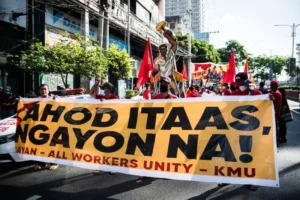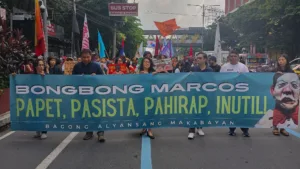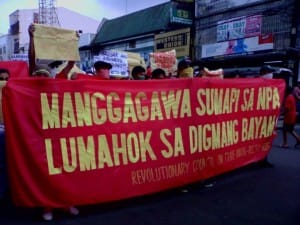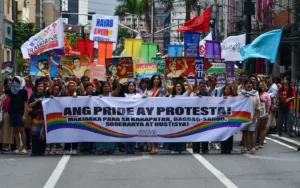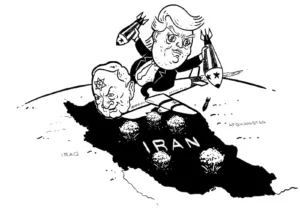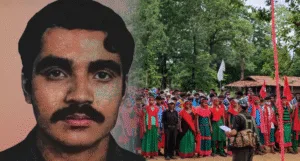Keynote to the International Theoretical Conference on Imperialism and War

Central Committee, Communist Party of the Philippines
October 14-15, 2023
The following address is the keynote of the International Theoretical Conference on Imperialism and War organized by the National Democratic Front of the Philippines (NDFP) on 14-15 October 2023 in Amsterdam, the Netherlands.
The CPP keynote speech provides guidance on how to understand imperialist wars from a proletarian-socialist perspective by outlining three key points namely 1) the inevitability of wars as malignant outgrowths of monopoly capitalism and a consequence of the ceaseless drive of finance capital to expand its spheres of influence; 2) the current balance of power among the imperialists and key flashpoints in the violent and non-violent conflicts between them including the prolonged war in Ukraine, the question of Taiwan and the Korean peninsula as the current expression of the US Indo-Pacific strategy of encircling China; and 3) the working class attitude and policy of opposing and preventing inter-imperialist wars. The CPP reiterates Lenin’s “Imperialism, the highest stage of capitalism” as the most scientific and thoroughgoing analysis of the end-stage of the capitalist system which allows for the correct reading of current inter-imperialist conflicts. The CPP clarifies its position on the war in Ukraine as a US-NATO-provoked and sustained war against Russia with Ukraine being used as proxy and base of the US to undermine and strangle Russia’s economic interests and hegemony. The CPP also points out to US imperialism’s “first island chain” strategy of surrounding China including the intensifying economic competition and military confrontation between the two rival imperialist powers.
The CPP calls for the unity of the international proletariat to prevent the outbreak of an inter-imperialist war. In closing, the CPP outlines the tasks in fighting imperialist wars: 1) consolidate proletarian class leadership; 2) strengthen international consultation and dialogue; 3) build the broadest anti-imperialist united front; 4) accelerate the overthrowof the reactionary state by taking advantage of the political and socioeconomic crisis conditions engendered by wars; 5) wage revolutionary armed resistance in the form of protracted people’s wars as determined by specific conditions in each country; and finally 6) build the organized strength of the broad masses of workers and peasants, intellectuals and other democratic forces by building factory unions, community associations and all other forms of organizations.
The Central Committee of the Communist Party of the Philippines (CPP-CC) extends its warmest greetings of solidarity to the participants of the International Theoretical Conference on Imperialism and War organized by the National Democratic Front of the Philippines (NDFP). We are deeply honored to keynote this conference and present our views on burning theoretical issues that have deep political and practical significance to the proletariat and broad masses of the people around the world in their fight against imperialist wars through revolutionary wars for national and social liberation and socialism

We are gratified by the participation of a significant number of communist parties and organizations from different parts of the world. We look forward to Marxist-Leninist theoretical discussions and exchanges of practical revolutionary experiences as means to building consensus on common actionable plans for cooperation, coordination, and mutual support in waging revolutionary struggles in our own countries, keenly aware of how we all form part of an international front against imperialism and imperialist war.
We cannot sufficiently underscore the significance of this international theoretical conference as it is being held amid rising inter-imperialist conflicts leading to open conflicts and wars. These unleash widespread brutalities and suffering to workers and other toiling people, subject less developed and semicolonial countries to greater national oppression, and further intensify exploitation of workers in capitalist countries. On the other hand, these also generate opportunities for communist and workers parties to raise their capability and place themselves in a better position to take advantage of a possible explosion of a revolutionary situation by leading the broad masses of workers, peasants and other exploited and oppressed classes onto the path of revolutionary class struggles in their countries.
We propose that this conference focus on the following key questions:
First, the theoretical framework governing the question of the inevitability of wars—specifically imperialist wars of annexation and intervention, as malignant outgrowths of monopoly capitalism, and as a consequence of the ceaseless drive of finance capital to expand its spheres of influence and fields of investment, and the striving for hegemony of imperialist powers.
Second, the current balance of power among the imperialists and key flashpoints in the violent and non-violent conflicts between them; heightening inter-imperialist armed confrontations due to the aggressive push of the US to impose unipolar dominance on a multipolar world; the prolonged war in Ukraine, as primarily a proxy war of the US and NATO against Russia; as well as rising threats of a hot war in Asia on the question of Taiwan and the Korean peninsula as the current expression of the US Indo-Pacific strategy of encircling China and containing its growth as an economic and military power.
And third, the working class attitude and policy of opposing and preventing inter-imperialist wars, demanding their immediate termination once they break out, and the policy of taking advantage of these wars to carry forward the democratic and socialist interests and strategic cause of the proletariat and other progressive and revolutionary classes.
Theory and history: Wars as a consequence of imperialism
Lenin’s “Imperialism, the highest stage of capitalism” is still the most scientific and thoroughgoing analysis of the end-stage of the capitalist system. It is a theoretical progression of Marx’s Das Kapital, in which Lenin incisively points out how capital and capitalist production have become so centralized that it has rendered free competition of the previous period no longer possible.
We remain in the era of monopoly capitalism and proletarian revolution as characterized by Lenin. As communists, it is of critical importance that we constantly study and review Lenin’s “Imperialism” in order that we strengthen our grasp of the Marxist-Leninist theoretical framework to serve as guide in understanding current-day phenomenon.
The essential features of imperialism, as Lenin identified and outlined as monopoly capitalism, remain to this day: (i) production and capital has become greatly concentrated that it has formed all-powerful monopolies; (ii) the formation and predominance of finance capital or the financial oligarchy based on the merging of bank and industrial capital; (iii) the export of capital, as distinguished from the export of commodities, has gained exceptional importance; (iv) formation of international monopoly associations which share the world among themselves; and, (v) territorial division of the entire world among the biggest imperialist powers is completed.
For purposes of our current discussion about imperialist wars, we will focus our attention on the fifth feature of imperialism—the territorial division of the entire world—without losing sight of the interaction of all the five features.
Writing in 1914, Lenin said, “For the first time the world is completely divided up, so that in the future only redivision is possible…”. At any given time, the existing “division” of the world was a result of the violent struggle between the imperialist powers. Any attempt at “redivision” can only succeed through further violent struggle. “The question is: what other means than war could there be under capitalism to overcome the disparity between the development of productive forces and the accumulation of capital on the one side, and the division of colonies and spheres of influence for finance capital on the other?”
Constant expansion is the natural course of capitalism, driven by the necessity to accumulate and reinvest surplus value, which is spurred by relentless capitalist competition. Capitalists do not rest content with what they have. Those who do so, get trampled by competition, and perish. Monopoly capitalism did not eliminate capitalist competition, but rather sharpened it. Imperialism constantly pushes competition to unprecedented levels, and raises the desire for expansion to even greater heights. Heightened competition greatly intensified the necessity of expanding sources of raw materials, fields of investments, markets, and spheres of influence and hegemony; and further enlarging the reserve army of labor to bring down the price of labor-power.
“Finance capital,” Lenin pointed out, “is interested not only in the already discovered sources of raw materials but also in potential sources, because present-day technical development is extremely rapid”. We see today how the race to search for more oil reserves, and sources of rare earth minerals for future materials development, have led the giants of finance capital to all corners of the earth and every square inch of land in the race to search rare-earth minerals, metals and other new material vital to the development of cutting-edge technology—including semiconductors and processors to support artificial intelligence—for communication, robotics, energy, space exploration and military purposes.
The insatiable desire to expand and the physical limits of the material world are contradictory aspects of the capitalist system. Under monopoly capitalism, this contradiction has been intensified by several orders of magnitude, with economic, political, military, as well as technological power concentrated in the hands of the financial oligarchy and its agents in the bourgeois state. Lenin pointed out that “finance capital in general strives to seize the largest possible amount of land of all kinds in all places, and by every means, taking into account potential sources of raw materials and fearing to be left behind in the fierce struggle for the last remnants of independent territory, or for the repartition of those territories that have been already divided.”
The above-mentioned contradictory aspects ultimately lead to hostile conflicts as the rivalry of powerful finance capitalists, who control entire states and its militaries, not to mention mercenaries and criminal organizations, come to a head. This is unavoidable. In 1920, Lenin wrote “Imperialist wars are absolutely inevitable under such an economic system (of monopoly capitalism), as long as private property in the means of production exists.” He exposed the first world war (1914-1918) as “a war for the division of the world, for the partition and repartition of colonies and spheres of influence of finance capital, etc.” In this war, the imperialist powers were divided into two main camps: the so-called Allies (France, UK, Russia, US, Italy and Japan), and the Central Powers (Germany, Austria-Hungary and the Ottoman Empire), with the nascent imperialist powers coveting the colonial territories of the old imperial empires.
Capitalist parasitism, decay and crisis creates conditions for revolution. Imperialist wars, especially, puts the entire reactionary bourgeois system in disarray. This, in turn, gives communist and workers parties the opportunity to expose the rottenness of the ruling system, and arouse and mobilize the people in socialist upheavals and wars of liberation. At the height of the first world war, Lenin espoused the policy of “revolutionary defeatism” or seeking the defeat of “one’s own” bourgeoisie when they engage in imperialist wars. This policy is consistent with the 1912 Basle Manifesto of the Second Internationale calling on socialists around to world “to utilize the economic and political crisis created by the war to arouse the people and thereby to hasten the downfall of capitalist class rule.” Lenin indefatigably fought the opportunism of the social chauvinists—socialist in words, chauvinist in deed. Their slogan calling for “defense of the fatherland” led to class collaboration with their “own” ruling bourgeois governments, and ultimately to the disunity among the socialist parties and the collapse of the Second Internationale.
In his introduction to Imperialism in 1920, Lenin said, “imperialism is the eve of the social revolution of the proletariat” citing the victory of the October 1917 Bolshevik revolution. This declaration will be proven correct by subsequent revolutionary victories across the world in the succeeding decades. The successful socialist revolution and construction in the Soviet Union liberated one-sixth of the globe from the imperialists, which also intensified inter-imperialist conflicts, and further generated conditions for waging revolutionary struggles across the globe.
It took just around two decades before the imperialist powers engaged in another global violent scramble for a new redivision of the world. Amid severe crisis, a number of imperialist powers resorted to fascism and dictatorship to intensify the exploitation of the proletariat and toiling people and carry out the most brutal attacks to smash the revolutionary resistance of the working class; intensify colonial oppression to enslave weaker nations; covet and carry out attacks against territories of their rival imperialists; and wage all-out attacks against the Soviet Union, then the global citadel of proletarian revolution and peace fortress. The second world war (1939-1945) was a war for a redivision of the capitalist world, with fascists powers seeking greater territories for imperialist expansion.
The Third Internationale under the leadership of the Communist Party of the Soviet Union, adopted the policy of building an anti-fascist Popular Front with the US, UK, France and other imperialist “Allied forces,” in the face of plans of Germany and Japan to attack the Soviet Union from its west and east flanks. The policy was to demand peace and prevent the outbreak of a global war; and when war broke out, to drive back the fascist onslaught against the Soviet Union under the slogan of defending the socialist fatherland; fight fascist colonial policy wherever it was imposed, such as in China, Indochina and Southeast Asia; wage revolution in countries under fascist rule such as in Spain, Germany, Italy, Japan; and advance the revolutionary struggles of the proletariat and people wherever possible. The proletariat and people of the Soviet Union, who have seen the fruits of socialist construction during the previous two decades and more, fought valiantly to defend the first socialist state and waged a patriotic war under the banner of the CPSU.
The antifascist united front or Popular Front policy was adopted by communist parties and applied correctly in many cases, and incorrectly in other cases. The Communist Party of China (CPC) correctly adopted the policy by building their independent power while uniting with the reactionary Chiang Kai Shek government, adopting the minimum land reform program to unite with the Chinese reactionaries in waging a common fight against Japanese fascism; demonstrating to the Chinese people that the CPC was resolute in liberating China from Japanese colonialism; and exposing the collaboration of Chiang Kai Shek with the Japanese forces in suppressing the CPC and the Red army. In the course of the people’s war against Japan, the Red Army achieved great victories and accumulated revolutionary strength.
In the Philippines, the Popular Front was also adopted in 1941 by the merger of the Communist Party of the Philippines and Socialist Party of the Philippines. However, it failed to exercise class independence and initiative and committed a series of errors in policy, principally Right opportunist errors. It limited itself to developing a legal city-based antifascist movement under the power of the reactionary US puppet regime, and as a consequence, was later forced to flee to the countryside in a disorganized way when the Japanese forces occupied Manila. Compelled by circumstances of colonial occupation, the leadership of the merger party decided to establish the Anti-Japanese People’s Army or Hukbalahap but failed to take advantage of the extensive Philippine countryside to wage widespread guerrilla warfare. It instead concentrated its troops in an isolated mountain stronghold in Central Luzon which made it easy target of Japanese colonial armed suppression. The merger party then proceeded to commit the error of “retreat for defense” and military passivity in line with the “lie-low” policy of the US Army Forces in the Far East (USAFFE). The policy was criticized and corrected in 1943 when the merger party adopted the policy of waging guerrilla warfare during which they were able to establish independent armed regimes in the Central Luzon and Southern Tagalog up until the end of the anti-Japanese war. But instead of consolidating and strengthening proletarian class independence and leadership, the merger party later “welcomed” back the American colonial forces, and proceeded to convert the revolutionary army into a “veteran” association, leading to armed suppression and massacres in revolutionary strongholds. Under the call for a united front with the puppet regime and “democratic peace,” the merger party turned to promote purely legal parliamentary struggle which eventually undermined the strength of the proletariat and the revolutionary mass base.
In other countries, the second world war generated conditions for the victory of national liberation and socialist revolutions in both Europe and Asia, including the victory of the people’s democratic revolution in China in 1949 and the liberation of the Korean peninsula in 1945 from 35 years of Japanese colonialism. Proletarian class rule converged during the years 1949 to 1956 during which time, one-third of humanity were living progressively under working-class leadership, before modern revisionist betrayals in the Soviet Union (1956 onwards) and China (1977 onwards).
Since the second world war, imperialists powers have so far avoided military conflicts of a global scale. However, in close to eight decades, imperialist powers have staged wars of aggression and intervention one after another, on various scales and duration. Since the 1950s, US imperialism has been the most aggressive. It maintains at least 700 overseas military bases and facilities scattered around the globe. It has eleven aircraft carriers (five times more than any other imperialist power) to project power and hegemony in any part to globe. It has mounted wars of aggression and intervention in Asia (China, Korea, Vietnam, Laos, Cambodia, the Philippines, Pakistan); the Middle East (support for Israel against Palestine, Iran, Kuwait, Iraq, Syria, and Afghanistan); in Eastern Europe, especially in connivance with the NATO (Yugoslavia, Ukraine); in Africa (Nigeria, Somalia, Sudan, Tunisia, Liberia, Kenya, Ethiopia, Libya); and in Latin America (Cuba, Nicaragua, Venezuela, Colombia). Up until the 1980s, the US justified its wars of intervention and aggression by claiming these to be part of the “war against communism;” and since 2001, a decade following the collapse of the Soviet Union, as a “war on terror.”
Imperialism is moribund capitalism marked by extreme parasitism and decay. It brings the contradictions of the capitalist system to its extreme limits. Over the past century or so, these contradictions have erupted in big and small wars, and will continue to periodically break out as monopoly capitalists engage in incessant competition marked by the relentless race to control bigger markets, sources of raw materials, reserve labor, spheres of influence and fields for investment for its surplus capital.
Current flashpoints of inter-imperialist conflict
Since the defeat of the socialist revolution in the Soviet Union and China, the world capitalist system has been marked by the following major contradictions: that between monopoly capital and the proletariat in capitalist countries; that between rival imperialist powers; that between the imperialist powers and oppressed peoples and nations; and that between imperialist powers and countries assertive of national sovereignty and socialist programs.
These contradictions reflect the main aspects of the current imperialist dominated global system. These describe the class nature of the most important issues, political conflicts, social upheavals, wars and revolutions confronting humanity at the current historical juncture. Any of these contradictions can become the principal contradiction that will define the main trend in the world. The intensification of these contradictions, singly or all at the same time, reflect the intensification of the crisis of the global capitalist system, as it moves from one period of crisis to another.
The current crisis period characterized by prolonged economic stagnation can be traced back to the financial collapse of 2008, from the rubles of which the US and other leading capitalist countries and entire global system have yet to fully recover. The prolonged economic stagnation has exposed the limits of neoliberal economic policies since the 1970s.
At the base of this prolonged stagnation is the capitalist crisis of overproduction, brought about by the basic capitalist contradiction of socialized production and private ownership of the means of production and appropriation of surplus value which invariably lead to anarchy in production. There are surplus inventories in almost all kinds of commodities from oil to grains, semiconductors to vehicles and so on. This leads to an intense capitalist race to control new markets, develop new commodities, cheaper and more abundant sources of raw materials, and so on. This race, in turn, leads to heightened inter-imperialist contradictions—the second of the four major contradictions stated above, which we shall focus on for purposes of our present discussion.
Armed conflicts around the world have ceaselessly erupted since the 1990s principally due to US imperialism asserting and imposing its preeminent military power. From the collapse of the Soviet Union in 1990 and rapid capitalist expansion in China up to 2010, the US asserted unipolar dominance in all parts of the world. The biggest wars of the last three decades have invariably involved the US. In the 1990s, the US (together with NATO) was involved in various armed conflicts in Eastern Europe (including the Balkan wars) to weaken the influence of Russia in the countries formerly belonging to the Warsaw Pact, and to strengthen NATO foothold. Since 2001, the US used its so-called “war on terror” to camouflage its drive to impose hegemony by invading and occupying sovereign territories, establishing armed presence in different countries around the world, as well as carrying out regime-change intervention to replace independent-minded governments with puppet regimes.
Since the 2010s, US rival imperialist powers led by Russia and China have been flexing their muscle and pushing for the establishment of a new multipolar world order, to reflect the actual economic and military balance of power. The establishment of the BRICS (Brazil, Russia, India, China and South Africa) economic cooperation and bank and the Shanghai Cooperation Organization (SCO) are direct challenges to long-standing US economic and military dominance. These challenges coincide with the strategic economic decline of the US resulting from, among others, a decline in manufacturing capacity, deep indebtedness and successive financial collapses from the dotcom bubble (2000), subprime or housing bubble (2007) and the bank meltdowns (2008).
The US is estimated to have spent between 7 and 8 trillion US dollars in its overseas wars since 2001. The US policy of endless wars is actively promoted by US finance capital, including banks and venture capitalists, which are deeply intertwined with the US military-industrial complex including arms manufacturers, defense contractors and private mercenaries.
Increasingly, the US has been directly aiming its economic, political and military guns at Russia and China. To assert its self-claimed global power while confronted with prolonged economic stagnation and crisis, the US aims to undermine and contain the economic, political and military power of its principal rivals Russia and China, and in doing so, is creating major flashpoints of inter-imperialist conflicts straddling Europe and Asia. There are also secondary flashpoints in the Middle East, Africa and Latin America that result from inter-imperialist rivalries, which also interact with US conflict with countries assertive of national sovereignty.
Currently the most important and intense is the US-provoked and -sustained war in Ukraine which has now ran for around 18 months. Another major flashpoint is the current building-up of US military forces from the South China Sea to the Pacific Ocean, together with its military subalterns (Australia and the UK under the AUKUS, and India, Japan and Australia under the Quad) as part of its so-called Indo-Pacific Strategy.
What is our attitude towards the war in Ukraine? It should be made clear that the war in Ukraine is in the nature of an inter-imperialist war, between Russia, on the one hand, and the US imperialists and its NATO allies on the other hand, with Ukraine being used as proxy and base of the latter to undermine and strangle Russia’s economic interests and hegemony. Of all the wars during the past decades, the war in Ukraine is the closest that the US has waged directly against Russia. With the involvement of the US and its principal NATO allies, the war has the potential of igniting a broader global war and sparking the use of nuclear arms and other weapons of mass destruction.
In provoking the war in Ukraine, the US and NATO alliance have the strategic aim of weakening Russia economically (seize control of mines and agricultural land and take away its European natural gas markets), politically (foment and support internal subversion and cause the dismemberment of the Russian federation), and militarily (erode its capacity by forcing it to fight a prolonged war), as well as to give US finance capital and the military-industrial complex the opportunity to make large amounts of profits.
Russia’s military assault against Ukraine (its so-called special military operation) is an act of counter-aggression. It is not an act of resistance against national oppression, rather is an act to defend its imperialist interests against NATO expansionism and encroachment on Russia’s old Eastern Europe sphere of influence, and moves to have Ukraine join the NATO. Russia’s objective is to secure the interests of its finance oligarchy, restore its political dominance in Ukraine to maintain the country as a buffer against NATO encroachment, and preserve the old agricultural and industrial territories under Russia’s hegemony. To attain its objective, Russia unleashed a great catastrophe on the Ukrainian proletariat and people. The international and Russian proletariat are neither sympathetic nor supportive of Russia’s war in Ukraine.
With the support of the US and NATO, the Zelensky government fomented Russophobe and carried out policies hostile to the Russian-speaking people and Eastern regions of Ukraine. Zelensky is hoodwinking the people of Ukraine and the world. He portrays resistance to Russia’s assault as a “patriotic war to defend Ukrainian freedom,” but is, in fact, seeking to amalgamate Ukraine to the US-NATO alliance, and place it firmly under the control and protection of the latter in order to prop up its ruling regime, secure the class interests of the bourgeoisie and perpetuate the oppression and exploitation of the Ukrainian proletariat and people. The international and Ukrainian proletariat are neither sympathetic nor supportive of the Zelensky regime serving as pawn in a war between imperialist powers.
The international proletariat must unite and denounce primarily the US/NATO imperialist bloc for generating conditions of war, provoking Russia to carry out its military assault in Ukraine, arming and using Ukraine as cannon fodder to serve US/NATO expansionism against Russia, and for prolonging the war by pouring an endless supply of weapons and military aid. The revolutionary proletarian forces in Russia and Ukraine, in particular, must take advantage of the conditions of war to accelerate efforts to arouse, organize and mobilize the working class and people in their countries in order to wage class struggles, build their unions and organizations, expose and oppose the war being waged by their ruling classes and demand its immediate termination through the most effective means. In order to do so, the communist party must be built or strengthened. It must strike deep and wide roots among the working class, and rouse the people to carry out armed resistance in appropriate forms and levels to accelerate the downfall of the ruling reactionary system.
Another flashpoint of inter-imperialist conflict is steadily developing in Asia. After having long colluded with China during the period of capitalist restoration from the late 1970s and through the period under the neoliberal policy regime, the US government declared its “pivot to Asia” in November 2011 to push US economic and geopolitical interests and counter the economic and military growth and influence of China.
In the hope of regaining its dominance, the US imperialists seek to erode China’s overwhelming advantage in manufacturing, especially in the technological sector, and contain its military influence. The US government has been demanding China to dismantle state corporations (controlled by state monopoly capitalists) in the guise of pushing for a “rules-based system.” To isolate China, the Obama government pushed the Trans-Pacific Partnership economic agreement which excluded China and carried out protectionist measures with the aim of drawing capital back to the US. Under Trump, the US imposed sanctions on Chinese imports to cut down on US trade deficits, and targeted Chinese companies which it accused of engaging in espionage for the Chinese government, in order to support US manufacturing companies.
Further heightening its push, the US has resorted to increasingly hostile acts against China. It pushed the NATO to openly declare China as a “strategic threat,” and has activated its military allies to increase military presence in the waters surrounding China in the guise of holding “joint patrols” and “freedom of navigation operations” which have become increasingly aggressive. The US has deployed at least five aircraft carriers (USS Ronald Reagan, USS Carl Vinzon, USS Abraham Lincoln, USS Nimitz and USS George Washington) in and around the South China Sea.
In line with its “first island chain” strategy of surrounding China from the closest islands, the US has further strengthened its military presence and prepositioning of missiles and other war matériel in Japan, South Korea and Singapore. It is fortifying its military foothold in the Philippines by establishing at least nine military bases and facilities, and conducting successive military exercises through which the US military has established its permanent presence in the country. For more than five years, it has been pouring large amounts of military support to the Armed Forces of the Philippines to heighten counterinsurgency operations in the hope of defeating the people’s democratic revolution being led by the Communist Party of the Philippines.
Over the past years, the US has been stoking “independence movements” in Mongolia, Hongkong, and Xinjiang, and has recently been fanning so-called Taiwan independence, in violation of its long-standing recognition of the “One China” principle. A cavalcade of US officials have visited Taiwan and declared that the US will “come to the defense of Taiwan.” A package of $500 million arms sale to Taiwan was approved just last August. One can observe that the US is using Taiwan to provoke China, in the same way that it used Ukraine to provoke Russia.
China’s response to US provocations is becoming more and more bellicose and aggressive. Historically, China has never engaged in aggression and occupation of territories. As a global revolutionary center from 1949-1977, it pursued a policy of supporting revolutionary struggles, unity with countries upholding national sovereignty, trade, diplomacy and military and nuclear parity with capitalist countries and imperialist powers. As an imperialist power since the late 2000s, China started to rapidly catch-up in terms of its military strength, increasing its defense spending for developing weapons (ultrasonic missiles) and aircraft carriers to raise its capacity to transport and deploy troops overseas.
China has yet to outrightly and militarily challenge the hegemony of the US or other imperialist powers. As an imperialist country, China has expanded its hegemony by throwing its economic weight around through large-scale infrastructure building under its so-called One Belt, One Road Initiative, and overwhelming and binding the economies of smaller countries through large amounts of loans and investments to finance the importation of commodities, extraction of minerals and raw materials, exploitation of cheap labor and so on.
With more than $820 billion in US treasuries and with the US serving as one of its principal foreign investor and export market, it is not to China’s interest to be completely decoupled from the US. At the same time, together with Russia, China is seeking to establish a parallel financial system that is not tied to the US dollar and financial system.
China’s military base in Djibouti in the western coast of Africa is its only foreign military base. It, however, has also established military facilities in reclaimed land within Philippines maritime territory, conducts maritime patrols and interdictions, and prevents small Filipino fisherfolk access to their traditional fishing grounds. The deployment of military forces in these facilities and waters are considered by the Filipino people as acts of aggression or incursion. In addition, China has also been establishing military facilities in Cambodia, Tajikistan and Pakistan.
The increasingly intense economic competition and military confrontation between the US and China are in the nature of contradictions between rival imperialist powers. In either side of the conflict, the ruling monopoly capitalists seek to secure and expand their imperialist power to oppress weak nations, exploit its people and plunder its resources. This conflict threatens to break out in open war as a result of the aggressive push of the US.
The international proletariat must unite and condemn the war preparations and do everything to mobilize the masses to prevent the outbreak of an inter-imperialist war that can only succeed in bringing untold misery and disaster to the working class and people, especially in the smaller countries which are being dragged into the conflict between the imperialist “great” powers.
Communist parties must rouse all patriotic and democratic forces in condemning principally US imperialism which is primarily responsible for generating conditions that are leading to the escalation of threats of war in the Asia-Pacific region. A regional and international united front of all anti-imperialist and democratic classes must be established to mobilize the biggest number of peoples against US intervention and war provocations, and against imperialist wars.
Imperialist China must be condemned for using its economic might to carry-out large-scale plunder of mineral and marine resources of weaker countries, exploitation of cheap labor, highhanded diplomacy, and trampling of their economic and political sovereignty.
The proletarian revolutionary forces in China must take lead in vigorously exposing modern revisionism and state monopoly capitalism; fighting the monopoly bureaucrat capitalists in the state and ruling pseudo-communist party; arousing, organizing and mobilizing the proletariat and people to carry out revolutionary class struggles; denouncing the policy of imperialist expansionism; and joining in a broad united front of peoples opposed to imperialist war.
The broad united front of all anti-imperialist forces must mobilize the biggest possible number of people in mass demonstrations to manifest widespread resistance to imperialist wars of aggression and war preparations. The strength of the anti-imperialist united front will be drawn primarily from working class unions and basic mass organizations of peasants and other democratic classes and sectors. The proletariat must militate the broad masses to wage struggles to resist worsening forms of oppression and exploitation, that must be raised and linked to the struggle against imperialist oppression and wars. Where applicable, communist parties must carry out revolutionary armed resistance, including people’s wars in semicolonial and semifeudal countries, as the principal form of struggle, in order to effectively fight imperialist armed suppression and build the independent political power of the proletariat.
The Communist Party of the Philippines considers waging people’s democratic revolution through protracted people’s war and all other forms of mobilizing the broad masses of the Filipino people to seek the downfall of the neocolonial state as its specific contribution to the struggle against inter-imperialist war. Waging revolutionary armed struggle in the Philippines as well as other countries is one of the most potent means to fight to prevent the outbreak of inter-imperialist war in the Asia-Pacific region. The armed revolution against US imperialism and its puppet forces in the Philippines serves as an impediment for US plans to provoke and ignite an armed conflict in the region that will drag the Philippines, knowing how this will generate conditions that will also rouse the Filipino people’s patriotism, stoke the flames of a revolutionary patriotic war.
Summary of our attitude and policy with regard inter-imperialist war
Amid the outbreak and threats of wars pitting the biggest imperialist powers against one another and unleashing the most terrible suffering to millions of workers and toiling people, it is of great urgency for the proletariat to put itself at the vanguard of the resistance to imperialist wars.
Drawing from past lessons, our general policy in relation to inter-imperialist wars can be stated in the following:
Fight imperialist wars, resist their outbreak, and when such wars break out, demand their immediate termination and take advantage of the economic and political crisis of the reactionary system by rousing the indignation of the people and mobilizing the masses to hasten the downfall of the ruling exploiting classes and advance the cause of national and social liberation, and socialism.
We must strengthen and consolidate the vanguard Party of the proletariat to lead and unite the workers and the broadest ranks of all democratic classes to carry out this policy.
We reiterate that the proletariat opposes inter-imperialist wars that serve the predatory and parasitic aims of monopoly capitalists to secure or expand the territories under their economic, political and military hegemony, which bring unspeakable misery and catastrophe to millions of people, and subject greater number of workers and people to even worst forms of oppression and exploitation.
The broad masses of the workers and people, whether in capitalist countries, in weaker capitalist countries or in semicolonies, oppose inter-imperialist wars. They must be roused and mobilized to fight these wars by waging revolutionary war in the form of protracted people’s wars in semicolonial and semifeudal countries and preparations for armed insurrection in capitalist countries.
History has proven that imperialism is the eve of proletarian revolution. Imperialist wars, in particular, generates a situation for the proletariat and other democratic classes to take advantage for advancing the revolutionary cause.
Today we face the real possibility of an escalation of current inter-imperialist wars and breaking out of new wars in different parts of the world. Guided by the above policy, the international proletariat must correctly combine the tasks of strengthening the Party, bringing together the broad masses under the banner of a united front against imperialist war, while taking advantage of the splits among the imperialists in order to carry forward the democratic and socialist revolution in their countries.
Ultimately, the fight against inter-imperialist wars rests on the proletariat and people waging revolutionary and class struggles against their “own” ruling class governments, whether in the aggressive or counter-aggressive imperialist countries, or in the countries that are being used as pawn, staging point or military foothold.
The proletariat and people must assert their class independence by not allowing the workers and people from being used as cannon fodder or mercenaries in the service of the ruling reactionary state. They must build all their strength to accelerate the downfall of the classes of exploiters and oppressors.
To recapitulate, let us sum up our tasks in fighting imperialist wars in the following order:
1. Build, strengthen and consolidate proletarian class leadership through their vanguard party by assiduously studying and applying Marxism-Leninism-Maoism on concrete conditions in their countries and striking deep roots among the working class and toiling masses.
2. Strengthen international consultation and dialogue between proletarian revolutionary parties to share experiences of revolutionary work and forge practical plans for cooperation, and mutual assistance and support.
3. Build the broadest united front to expose, oppose and demand an end to all imperialist wars. Formal or informal, temporary or long-term alliances can be built on the basis of the following demands or a combination of these:
- Immediately terminate the war in Ukraine and end US-NATO interference and expansionism.
- Cease US-supported Israeli bombardment of Gaza and end US support to Israeli occupation of Palestinian territories.
- Stop US military build-up in the South China Sea, fanning Taiwan “independence,” and using its military bases and facilities in countries in the “first island chain” for war provocations against China
- End the frenzy of military spending and reallocate funds to social spending
- Dismantle all overseas US military bases and facilities from Asia to Africa. Withdraw and send home all US troops and aircraft carriers.
- End imperialist support and military aid for repressive regimes such as the Marcos government in the Philippines, the Modi government in India and others.
- Abrogate all lopsided military agreements allowing imperialist powers to use its semicolonies as military strongholds.
- Stop US-sponsored drone warfare and aerial bombing campaigns in India, the Philippines and other countries.
and other demands against wars of aggression, military intervention, proxy wars, war preparations, deployment of overseas military forces, maintenance and expansion of foreign military bases, increasing defense spending and arms race, and extending military aid for repressive regimes and occupying forces.
4. Accelerate the overthrow of the reactionary state of the ruling exploiting classes by taking advantage of the political and socioeconomic crisis conditions engendered by wars.
5. Wage revolutionary armed resistance in the form of protracted people’s wars for national and social liberation or conduct preparations for armed insurrections as determined by specific conditions in each country.
6. Build the organized strength of the broad masses of workers and peasants, intellectuals and other democratic forces by building factory unions, community associations and all other forms of organizations. Amid the crisis made worse by wars and war spending, carry out strikes and other mass struggles in defense of class and democratic interests.
In closing, the CPP Central Committee wishes all success to the International Theoretical Conference on Imperialist Wars. We look forward to a healthy and productive exchange of ideas and experiences in our effort to further promote and enrich Marxism-Leninism-Maoism as we resist imperialist and wage revolution for people’s democracy and socialism.
Let us unite and raise our voices as one:
Workers and all oppressed peoples of the world, unite against imperialism!
Wage revolutionary wars to fight imperialist wars!
End imperialist oppression and plunder!
Advance the people’s democratic and socialist revolutions!
Uphold Marxism-Leninism-Maoism!
Long live the communist party and international proletariat!
